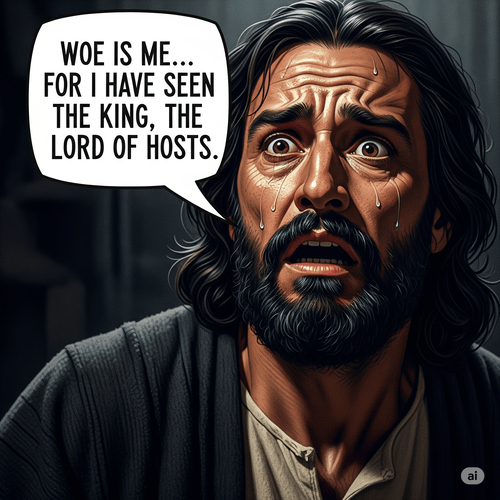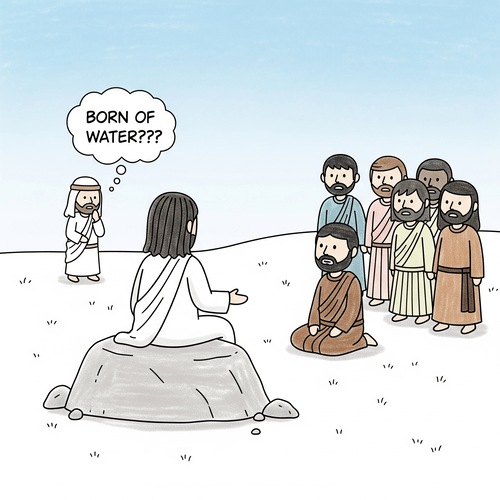The Upper Room Discourse: Christ’s Love Letter Written in Blood
The Upper Room Discourse: Imagine being in that room during history’s most important conversation. The air is thick with anticipation. In mere hours, the world will change forever. Jesus Christ, knowing His crucifixion approaches, gathers His closest followers—and that includes US—for one final, intimate teaching. These aren’t just last words—they’re the culmination of God’s love, a sacred revelation of His heart, and a blueprint for the Christian life. In John Chapters 13-17, we witness a love letter written—to US—not with ink, but with the very blood Christ would soon shed. Every word pulses with eternal significance. Every promise resonates with divine power.
As we read this post, Christ urges us to pause and read John 13-17 in its entirety. He urges us to find a quietspace. To turn off our notifications. These five chapters deserve our undivided attention. They contain treasures that have sustained believers through persecution, comfort that has dried countless tears, and promises that have launched global movements. May we give ourselves the gift of experiencing these words as they were first delivered—in one sitting, with an expectant heart.
John 13: The Demonstration of Divine Love
The scene opens with an act so profound it still challenges our understanding of leadership and love. The Creator of the universe, knowing His divine origin and destiny, wraps a towel around His waist and prepares to wash His disciples’ feet. And we’re among them. This isn’t a mere object lesson—it’s a preview of the cross. Every drop of water foreshadows drops of blood. Every humble motion anticipates the ultimate descent into death.
But notice carefully: Jesus washes all our feet, including those of His betrayer. This isn’t love responding to worthiness; this is love creating worth. Here we see love that doesn’t depend on our response but flows from its own divine fullness. This is love that serves not because of who we are, but because of who He is.
Are we protesting like Peter did? “Surely not my feet, Lord!” Are we thinking we’re too unworthy? Or perhaps too self-sufficient? Remember, this is about so much more than clean feet. Watch Jesus’ hands in the basin. Each gentle touch foreshadows the ultimate cleansing He’s about to accomplish on the cross. He’s showing us what real love looks like—love that stoops, love that serves, love that isn’t afraid to touch our dirt.
Do we see now why He’s doing this? The basin reflects His heart. He didn’t come to be served, but to serve. And this love He’s showing us? It’s the same love He’s calling us to show others. Not a love that waits for worthiness, but one that creates worth in its wake.
John 14: The Promise of Divine Provision
As anxiety fills the disciples’ hearts and ours, Jesus unveils promises that will echo through centuries. “Let not your hearts be troubled,” He begins, before unfolding for us a vision of eternal security that transcends all earthly guarantees. He see our troubled hearts. Our anxiety about tomorrow. Our fear of being left alone. Come, let Him tell us about His Father’s house. Those rooms He’s preparing, one that has our name on it. Yes, ours. And when He says He is the way, the truth, and the life, He’s not just making a theological statement—He’s offering us Himself as our path home.
But He doesn’t stop there. Knowing the impossible tasks that lay ahead of us, He assures us He won’t leave us to walk this path alone. The Helper He promises—His very Spirit—is His personal gift to us. The same Spirit that will raise Him from the dead will soon make His home in us. Are we feeling inadequate for what lies ahead? Good—that’s exactly where He wants us. His strength is perfected in our weakness.
John 15: The Union of Divine Life
Through the metaphor of the vine and branches, Jesus reveals to us a union so intimate it defies human categories. This isn’t mere association or even close friendship—this is life-giving, fruit-bearing organic connection. Our safety as the branches isn’t in our strength but in our connection to Him, who is the Vine. Our fruitfulness isn’t achieved through striving but through abiding.
Jesus invites us to feel the branches beneath our fingers. This is how close He wants to be to us. Not just nearby, not just watching over us, but living in us. When He says “Abide in me,” He’s inviting us into a union so deep that our very life flows from His. We’re to stop striving so hard to produce fruit. A branch doesn’t strain to bear fruit—it simply stays connected to the vine.
This union explains both the world’s hatred and the believer’s joy. Connected to Christ, we share not only His life but also His experience—both of divine fellowship and human rejection. And when the world hates us—notice He says when, not if—may we remember: they hated Him first. Their rejection is proof of our selection. We’re not of this world anymore because He chose us out of it. Yes, He chose us. Before we chose Him, He chose us.
John 16: The Victory of Divine Purpose
Even as He prepares the disciples and us for persecution, Jesus speaks of certain victory. Jesus knows we shall soon face trials. There will be times when the darkness feels overwhelming. But listen closely: The Spirit’s work will be unstoppable, bringing conviction to the world and illumination to believers. Sorrow will be transformed into joy—not by circumstance but by divine decree. Prayer will gain new power through Christ’s name, and access to the Father will be permanently secured for us.
So when sorrow comes, may we remember: it will turn to joy. Not might, not could—but will. Like a mother forgets her labour pains in the joy of new life, we shall forget our present struggles in the joy of what they produce. We’re invited to ask the Father anything in Jesus’ name. We have this right not because of our perfection, but because of His finished work.
In what might be the most audacious statement ever made, Jesus declares, “I have overcome the world.” Notice the tense: not “I will overcome” but “I have overcome.” Before the cross, before the resurrection, victory was already certain because divine purpose cannot fail.
John 17: The Glory of Divine Unity
The discourse culminates in Chapter 17 with what has been rightly called the Holy of Holies of Scripture—Jesus’ High Priestly prayer. Here we overhear conversation within the Trinity. We witness the Son reporting to the Father the completion of His mission. We hear Him pray for all who will believe—including us—requesting our preservation, our sanctification, and our ultimate glorification.
So let’s lean in close now. Jesus wants us to hear Him talk to His Father about us. Did we catch that? He’s praying for us—by name. For our protection. For our sanctification. For our unity with other believers. This prayer will not end here in the upper room—for He’s still praying it for us now at the Father’s right hand.
The glory the Father gave Him? He has given it to us. The love the Father has for Him? It’s ours too. When we feel unloved, unworthy, may we remember: we’re included in this conversation within the Trinity itself.
Jesus’ prayer reveals unity among believers isn’t primarily about organisational alignment but about reflecting Trinitarian fellowship. The love between Father and Son becomes the model and source of love between us as believers. The glory shared within the Trinity becomes the glory that transforms us.
The Upper Room Discourse: Christ’s Call to Us
These chapters aren’t just historical record—they’re present reality. The same love that moved Jesus to wash feet now moves through His church. The same Spirit who would guide the disciples now illuminates our understanding. The same power that guaranteed their fruit now ensures ours.
In a world fractured by division, these chapters call us to supernatural unity. In a culture obsessed with self-promotion, they show us the beauty of self-giving love. In an age of anxiety, they offer unshakeable peace. In times of persecution, they assure us of ultimate victory.
May we take time this week to return to these chapters again. To read them slowly. Read them prayerfully. May their promises sink deep into our soul. Remember: these words aren’t just information about divine love—they’re an invitation into it. This love letter, written in blood, bears our name. Its promises are ours to claim, its power ours to experience, its unity ours to demonstrate.
The Upper Room Discourse—Related FAQs
Why did Jesus wash His disciples’ feet before teaching these profound truths? The foot washing wasn’t merely about cleanliness or humility—it was a prophetic act demonstrating the character of divine love. By serving those He had chosen, including His betrayer, Jesus showed that His love flows from His nature rather than our worthiness. This act previewed the cross, where He would perform the ultimate act of cleansing service not because we deserved it, but because it was His sovereign purpose to love His own to the end.
- How can we be certain we’re truly connected to Christ as branches to the vine? True connection to Christ inevitably produces fruit, though the timing and nature of that fruit is determined by the Vinedresser. The key evidence isn’t found in occasional good works but in a sustained pattern of growing love for Christ and His people, increasing hatred of sin, and deepening appreciation for grace. Remember, the focus isn’t on the branch’s effort to produce fruit but on its living connection to the vine.
- If Jesus promised joy, why do believers still experience sorrow? Jesus never promised the absence of sorrow but rather its transformation into joy through His sovereign purpose. Just as a mother’s labor pains are transformed into joy by their purpose, our sorrows are being worked into a weight of glory by divine decree. The joy Jesus promises isn’t dependent on circumstances but on our secure union with Him.
- What does it mean to pray “in Jesus’ name”? Praying in Jesus’ name isn’t merely adding a phrase at the end of our prayers but approaching God with Christ’s authority as those united to Him. It means our access to the Father is secured not by our worthiness but by Christ’s finished work. Such prayer flows from our identity as those chosen and united to Christ, knowing the Father delights to give good gifts to His children.
How should we respond to the world’s hostility toward Christian faith? Jesus taught that the world’s hostility actually confirms our identity as His chosen ones—if we belonged to the world, it would love us as its own. This opposition shouldn’t surprise or discourage us but rather assure us we’re walking the path our Master walked. Our response should be continued love and witness, knowing the same Spirit who emboldened the first disciples empowers us.
- What role does the Holy Spirit play in our understanding of these truths? The Spirit’s role is essential and sovereign—He doesn’t merely assist our understanding but creates it. The same Spirit who inspired these words illuminates them in our hearts, bringing conviction of their truth and application to our lives. Without His work, these chapters would remain merely interesting historical documents rather than living words that transform.
- How can we maintain unity with other believers when we disagree on various issues? The unity Jesus prayed for isn’t primarily about organisational alignment or complete agreement on secondary matters, but about a deeper spiritual reality reflecting Trinitarian fellowship. This unity is founded on our shared union with Christ, manifested in love, and maintained by focusing on essential truths while showing grace in differences. The Spirit Himself preserves this unity even as we work to maintain it.
- What does it mean practically to “abide” in Christ? Abiding isn’t primarily about our activities but about resting in our union with Christ, established by His sovereign choice. Practically, it involves continual dependence on His Word, regular communion through prayer, and conscious reliance on His Spirit’s work in us. The key is remembering that abiding is more about position than performance—we work from our rest in Him, not for it.
- How can we be confident of our spiritual security when we still struggle with sin? Our security rests not on our performance but on Christ’s perfect work and the Father’s sovereign purpose to keep those He has given to His Son. Jesus’ prayer in John 17 reveals that our preservation is a Trinitarian undertaking—the Father gave us to the Son, the Son died to secure us, and the Spirit seals us. Our struggles with sin, while serious, cannot overcome God’s sovereign purpose to preserve us.
What’s the relationship between divine sovereignty and human responsibility in bearing fruit? The fruit we bear is simultaneously entirely God’s work and truly our action—He sovereignly produces it, yet we really act in bearing it. The key is understanding that God’s sovereign work doesn’t negate our responsibility but establishes and ensures it. This is why Jesus can command us to abide while simultaneously teaching that He chose us and appointed us to bear fruit.
The Upper Room Discourse—Our Related Posts
Editor’s Pick
Noah’s Flood: Where Did All the Water Come From? And Go?
The question hits every Bible-believing Christian at some point: “If Noah’s flood covered the whole earth, where did all that [...]

No Marriage in Heaven? What Does Mark 12:25 Mean?
“Will I see my spouse in heaven? Will we still be married?” These questions pierce the heart of every Christian [...]

The Terror of Meeting God: What Isaiah 6 Reveals About Divine Holiness
WHEN ‘WOE IS ME’ IS THE ONLY PROPER RESPONSE TO A GLIMPSE OF GOD Picture this: You’re a prophet of [...]

Is the Holy Spirit Present in Unbelievers? The Biblical Answer
Can someone who doesn’t believe in Jesus Christ have the Holy Spirit living inside them? This question strikes at the [...]

The Gap Theory Exposed: Why Embrace a Young Earth?
The Gap Theory proposes there’s a vast time gap—millions or billions of years—between Genesis 1:1 (“In the beginning God created [...]

Rethinking Sickle Cell Anaemia: A Case for Intelligent Design
Sickle cell anaemia presents what many consider evolution’s strongest card—a genetic condition that causes suffering yet provides protection against malaria. [...]

‘Bad’ Design: Flaw in Nature Or Flaw in Our Perspective?
When the Eiffel Tower was first proposed, critics called it a monstrous eyesore that would ruin Paris forever. Today, it’s [...]

The Problem of Divine Absence: How Do Believers Cope?
WHEN GOD SEEMS FAR: THE GREAT DISCONNECT Ever wondered why God seemed so close to Joseph in his Egyptian prison, [...]

Is ‘Gay Christian’ a Biblically Acceptable Identity to Have?
THE QUESTION OF IDENTITY IN BIBLICAL PERSPECTIVE The term “gay Christian” has become increasingly common in contemporary religious discourse, representing [...]

What Does ‘Born of Water’ in John 3:5 Mean?
THE REFORMED VIEW VS OTHER INTERPRETATIONS ”Jesus answered, ‘Truly, truly, I say to you, unless one is born of water [...]






